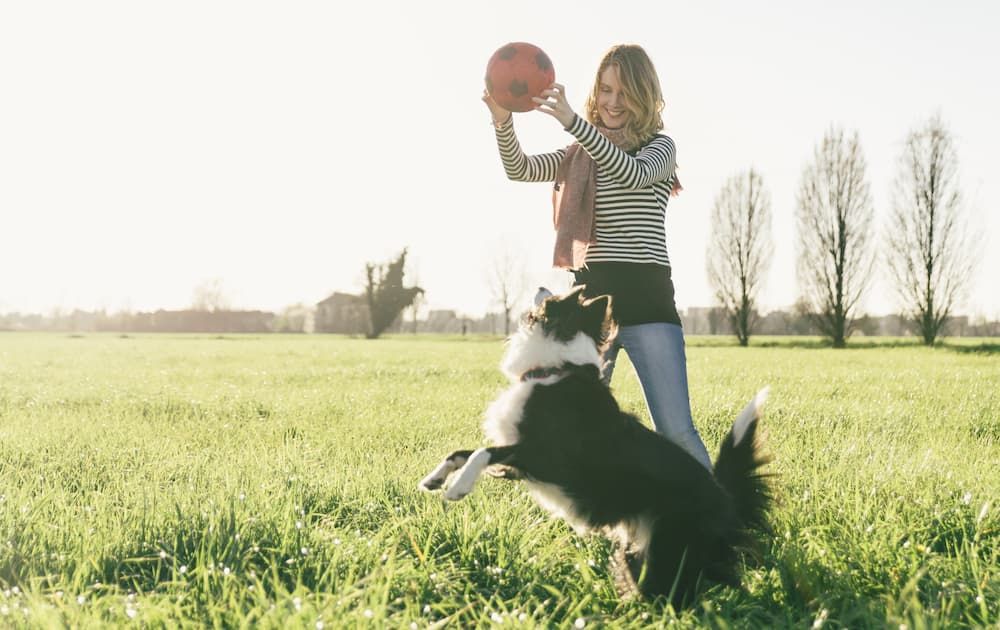Am I Ready to Be a Dog Parent? 7 Things to Consider Before Getting a Puppy
Written by:
Author: Alina Andreeva
Alina A. is a professional writer, editor, and pet-lover. She has published over 50 articles on how to care for pets properly. Alina has been writing articles for 3 years, so she has considerable experience in this niche. Her natural curiosity helps her to expand her knowledge and learn new pet care life hacks, which will make your life much easier.
View all 79 articlesLearn about our editorial process and veterinary review board.
Reviewed by:
Veterinary review
by Dr. Linda Simon
Dr. Linda Simon is a veterinary surgeon working with seven years of experience. She is a fellow of the British Veterinary Association and specializing in animal medicine. Also, she has been the Woman magazine resident vet for the past two years and writes a regular column for them, focusing on pets and their health.
View all 30 articlesLearn about our veterinary review board
Viewed: 227
Updated on: 06/15/2022
They are smart, cute, loving, and cuddly. Recent studies show that our fluffy friends have a profoundly positive impact on our health. But before you jump in and bring home a puppy, it’s time to do your research to make sure you’re making the decision which will not result in a disaster for you and your new pup. Many people don’t realize this is a lifetime commitment and impulsively get a dog. Over time, they turn out not to be ready for a pet, leading to heartbreak and many abandoned dogs in animal shelters. Even if potential pet owners are responsible for all aspects of their lives, they may not understand how much resources and time they need to care for a puppy.
Before you decide to bring a new pup into your family and make your way to a local animal shelter or a reputable breeder, take a little refresher course. This will help you improve your life and your puppy’s life and not regretting your decision.
Points to know before adding a Dog to your family
1. You’re Ready Financially
It doesn’t come cheap to be a dog owner, and you must make a pet care budget before taking the leap. Suppose you look into all of the costs and realize that you can’t support another fluffy member of your family. In that case, it’s a discernible sign you’re not ready to dive into the responsibility.
When considering dog expenses, you should think about food, toys, getting a pooch neutered or spayed, vet checkups, parasite prevention, and annual vaccinations. Make sure you have enough money in case of out-of-the-blue emergencies, as you don’t want to get stuck in a situation where your new family member needs help, and you can’t afford it. For example, the cost of repairing a fractured bone can add up to thousands of pounds. You should consider purchasing pet insurance after you (as soon as you) adopt a dog because it may cover a large percentage of vet expenses. Don’t’ wait until a dog gets injured or becomes ill to take out insurance, as this will be classed as a pre-existing condition and will not be covered by the policy.
2. You’ve Done Your Research
“As a future pup owner, you need to know all basic needs. If you’re a newcomer in dog parenting, do a bit of research about different breeds and dogs in general. Read articles about care, talk to people who have adopted a dog-in-need from a local animal shelter if you want to go through the rescue process and save a dog’s life, or talk to other dog parents who have the breed you’ve always dreamed of”,
says Victoria Schade, a dog trainer.
You should learn the basics, such as how to identify the symptoms of a disease, temperament problems, etc. There are tons of breeds, and some of them have different needs. For example, Labradors and Border Collies are high-energy pets that need a lot of space, playtime, and exercise. If you live in a small apartment and work takes up a good chunk of your day, these dogs are not the right choice for you. If you settle on a pedigree, their parents must have the relevant health tests suggested by their breed society. For example, German Shepherss should come from parents who have got satisfactory hip scores for hip dysplasia.
Remember, cross-breeds and Heinz 57’s are a good option too, and many enjoy better health than their pedigree counterparts.
Those with children need to ensure they plump for a tolerant breed and aren’t prone to resource guarding or aggression.
You can’t get over-prepared to gather as much helpful information as possible when you decide to welcome a four-legged friend into your home.
3. You have enough time
Initially, pups need you around pretty much all the time, and even as they get older, they cannot be left alone for more than a few consecutive hours.
You will have to devote your time to a new family member, including time for training, vet visits, and daily walks, even when the weather is nasty, or you just don’t feel like going out. If you have a dog walker, it’s better to take your pet for a walk on your own at least several times a week to promote the bond between you and your pooch pal.
Many dogs will develop separation anxiety if left alone for prolonged periods, which can be a vice that is hard to cope with. This is especially the case in more ‘clingy’ breeds, such as Maltese dogs and Bichon Frises.
You’re ready to become a pup parent when you’ve done a considerable amount of soul-searching to determine that you have enough time and energy to care for a dog.
READ MORE: Best Harness for Small Dogs
4. Your Home is Appropriate for a Dog
If you decide to become a pup parent, make sure that your home is puppy-proofed before bringing a cute little bundle of fur home. Hide your shoes and valuable things the little guy or gal can chew on, make the trash can inaccessible, and use baby gates to limit the area where the puppy can roam around your home. Keep any potential toxins such as chemical cleaners and human medicines locked away.
Organize your home space as if you’re bringing home a young dog, even if your new four-legged friend is an adult. Invest in toys that can keep your pet busy.
Larger and more energetic breeds will need a large home and some fenced-in outdoor space to ensure their activity requirements are met. For example, it wouldn’t be appropriate to house an Alaskan Malamute in a small apartment.
5. Your Lifestyle Accommodates a Dog
If your work takes up the majority of your time or you love frequent traveling, a dog may not be a good match for your lifestyle. Leisure time holds a valuable place in everybody’s life. Think about whether you can incorporate a dog into your lifestyle. Consider whether or not you’re ready to make changes to your life to care for your pet correctly. If not, now is probably not the right time to bring home a dog. If you want to make adjustments to your lifestyle, consider the time it will take to meet basic needs, such as training, exercise, and vet care. Then, decide if you can squeeze in the time.
6. You’re Ready to Deal With Mud. And Poop. And…
All kinds of other unpleasant fluids, such as drool, urine, and vomit. You will deal with all this every day, and if you happen to get a naughty puppy, you may do many other disagreeable things regularly.
Get ready for this particularly fun part of owning a dog by stocking up on poop bags and carpet cleaners before you really need these items.
You will also need to be prepared to groom your dog, especially if they are long-furred. Those with long and pendulous ears may need them cleaned and plucked. Similarly, all dogs should have their teeth brushed a few times a week.
7. You’ve Found a Trainer and a Vet
Do some online research or talk to pet owners in the neighborhood to find a trainer and a vet. Take a visit to the veterinarian near you and speak to him/her about any questions you may have before getting a dog. Most soon-to-be owners fail to do this, but vets are happy to have this discussion and help owners decide on which dog (if any) is right for them.
When it comes to finding a trainer, think about registering for puppy kindergarten or dog training courses as early as possible so that your fluffy family member could start socializing as soon as he comes home. Try to find a trainer that uses positive reinforcement rather than force or punishment-based techniques, which are now widely regarded as being outdated.
READ MORE: Best Cheap Dog Food
The bottom line
None of this should discourage you from bringing home a puppy. Dogs can enhance the quality of your life.
Before making the commitment, make sure that you know what duties you’re entering upon for introducing a new pet into your life. It will help you create suitable conditions, create a strong bond between you and your new pup, and enjoy many happy years together. Good luck!
 Dog Care Can Dogs Eat Olives? Benefits and Dangers of Feeding Olives to Your Dog
Dog Care Can Dogs Eat Olives? Benefits and Dangers of Feeding Olives to Your Dog - 167
- 0
 Dog Care My Dog Keeps Scratching His Mouth: Reasons Why Your Dog Scratching Face
Dog Care My Dog Keeps Scratching His Mouth: Reasons Why Your Dog Scratching Face - 17561
- 1
 Dog Care Do Dogs Get Tired of Barking? 10 Common Reasons for Dog Barking and How to Stop It
Dog Care Do Dogs Get Tired of Barking? 10 Common Reasons for Dog Barking and How to Stop It - 319
- 0
 Dog Veterinary Tips Why is my Dog throwing up: Causes and Preventing (Veterinary Advice)
Dog Veterinary Tips Why is my Dog throwing up: Causes and Preventing (Veterinary Advice) - 23424
- 5
 Dog Care Why Is My Dog Bleeding From Its Butt? Causes and treatment of rectal bleeding in the dog
Dog Care Why Is My Dog Bleeding From Its Butt? Causes and treatment of rectal bleeding in the dog - 22095
- 0
 Dog Care My Dog Keeps Scratching His Mouth: Reasons Why Your Dog Scratching Face
Dog Care My Dog Keeps Scratching His Mouth: Reasons Why Your Dog Scratching Face - 17561
- 1





















